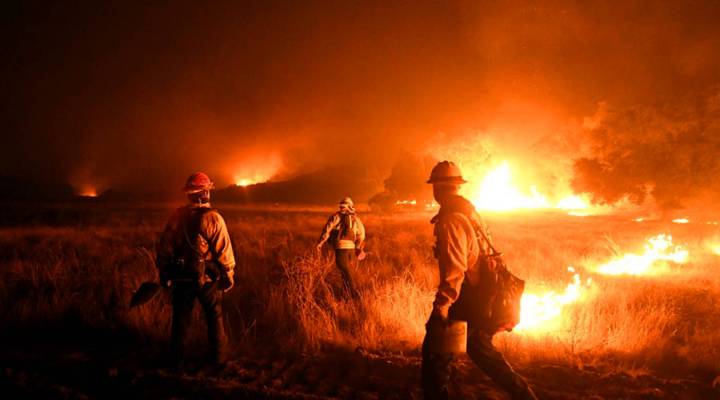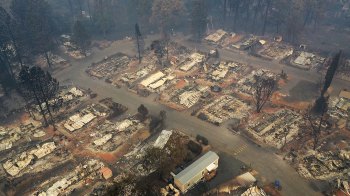
What tech can — and can’t — do to prevent and put out wildfires
What tech can — and can’t — do to prevent and put out wildfires

This year has been a terrible one for wildfires. Millions of acres in Montana, Oklahoma, Florida, Texas and North Carolina and South Carolina have been damaged. There was the fire in California that killed 44 people and burned thousands of homes and businesses in wine country in October. And now, Los Angeles has entered its second week of the Thomas fire.
Marketplace Tech host Molly Wood talked with Brandon Collins, a research scientist at University of California, Berkeley’s Center for Fire Research and Outreach, about how its lab is using technology in fire research. Below is an edited excerpt of their conversation.
Molly Wood: What tech is helping with understanding fires?
Brandon Collins: One of the more recent ones is LiDAR, and that is short for light detection and ranging. It’s a sensor, it’s called an active sensor, that sends light pulses, usually from an aircraft, that penetrate the forest canopy, and the time that it takes for those light pulses to hit something in the forest and bounce back up to the sensor has been related to the height of the vegetation that it’s hitting. So what it’s allowed for is a really neat characterization of forest. And from a fire standpoint, really trying to describe the arrangement and the quantity of fuel in the forest — it’s kind of weird sometimes to think about trees and shrubs as fuel, but from a fire standpoint that’s really what they are.
LiDAR Fly-Through of Klamath from Marketplace on Vimeo.
Wood: And I have to assume there are some drones in there, too.
Collins: Yeah. The drone stuff is really on the experimental side of things, but it kind of looks promising. We’ve been able to fly pretty close to the tops of tree canopies and from a detailed standpoint been able to map the vegetation or the fuel. And we’re going to follow that up by running the same flights again one year after doing prescribed burning. We can look at how fuel and vegetation was consumed in those prescribed fires. And then one other application we’ve had with drones is to sample the smoke that we’ve generated in doing prescribed fires. We actually had a crew that was flying their drone right into the plumes of smoke. It was, I think, at least successful from a sampling standpoint to gather the information.
Wood: And then how much of the work is predictive? Do you gather a bunch of data and try to figure out what a fire is going to do then?
Collins: We do, and we’re not great at it. The complexity of fire is something that I feel like we’re only learning more about, and learning that we’re having less predictive capability lately. We’re seeing some behavior of fires that we just can’t flat out, at least with some of the existing models that we use, we can’t predict. Our fire behavior prediction models were built in wind tunnels, largely with known fuel beds. And so we’ve really kind of existed at a small spacial scale.
Wood: Firefighting seems to be a job, obviously, where people on the ground is really important, despite being incredibly dangerous. Do you see that changing? Do you see firefighting robots in the future?
Collins: No, frankly. I mean, someone might tell you something different, but I don’t. I just think there are too many factors that have to be made with a really local and onsite, at-that-moment type of decision that I’m not sure we can program into some kind of other technology.
There’s a lot happening in the world. Through it all, Marketplace is here for you.
You rely on Marketplace to break down the world’s events and tell you how it affects you in a fact-based, approachable way. We rely on your financial support to keep making that possible.
Your donation today powers the independent journalism that you rely on. For just $5/month, you can help sustain Marketplace so we can keep reporting on the things that matter to you.


















